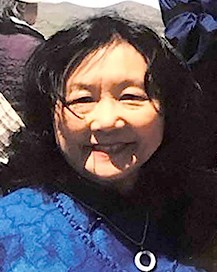
Connie Yu at the event (Photo provided by Al Young)
By Connie Young Yu
Chinese Historical Society of America
Greetings. I am a descendant of a Chinese railroad worker, an American, and speaking about American history.
My great-grandfather, Lee Wong Sang, was one of the thousands of unsung heroes, building the railroad across the Sierra Nevada mountains, laying tracks through to Utah, uniting the country by rail. Many descendants of Chinese railroad workers are here today. This is a far cry from 50 years ago. At the Centennial in Promontory, May 10, 1969, my mother, Mary Lee Young, was the only such descendant present.
What the Chinese achieved for the First Transcontinental Railroad was epic: the superhuman effort of a vanguard of Chinese towing locomotives and rails 28 miles over the summit, and the building of 15 tunnels in the Sierra Nevada mountains. Scores were killed in explosions, and in the horrific winter of 1866-67, work crews were buried by avalanches.
Then in spring of 1869, out of the mountains into the desert of Utah, Chinese went from six inches a day building Summit Tunnel, to laying 10 miles of track in one day. It took the incredible organization of wagons, carts, horses, and equipment, and the teamwork of hundreds of Chinese tracklayers and eight Irish rail handlers. This record-setting feat on the road to Promontory is unequaled in history. The trust and cooperation between workers with a common purpose was a zenith of the human spirit.
The Centennial was a grand moment to celebrate the monumental achievement the Chinese were a part of.
Yet why were the Chinese denied their rightful place in history at the 100th?
Why was Philip Choy, president of the Chinese Historical Society of America, kept from making a presentation on the official program?
Why did then Secretary of Transportation, John Volpe, state in his keynote address, “Who else but Americans could chisel through miles of solid granite. Who else but Americans could have laid 10 miles of track in 12 hours?”
Because the contribution of the Chinese to the Transcontinental was kept from national memory. The exclusion law of 1882 stopped the immigration of Chinese laborers, and denied all Chinese naturalization to U.S. citizenship. In effect for 61 years, the law excluded the Chinese from American history.
Today, we take this opportunity at the 150th to reclaim a place in history.
We honor the courage, fortitude, and sacrifice of Chinese railroad workers, and their legacy in America, which involves us all. It takes many a village to build a railroad. We stand on broad shoulders, my ancestors and yours, those who fought exclusion, and struggled for justice and equal rights. Let us be proud immigrants that make up America, so we can have this moment of solidarity, and fortify a milestone in U.S. history. Hammering in the last spike. Done!
Connie Yu Young is a Chinese American writer, historian, and lecturer.




What an eloquent and elegant speech from the perspective of an historian with a Chinese heart. By her reminder of Volpe’s sins of omission and her redress to set the record straight, she has set a marker on the ground to help future generations remember the contributions of the Chinese immigrants that set the foundation enabling America to become great.